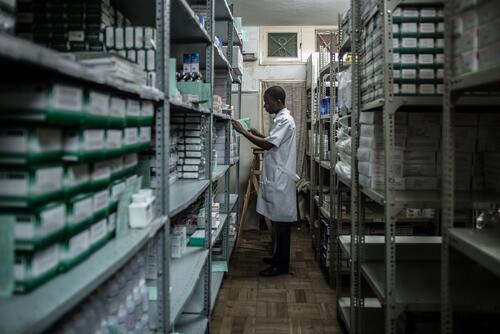
14,400
14,4
1,900
1,9
31
31
Mozambique has one of the highest HIV prevalence rates in the world. Around 13 per cent of people aged 15-49 are infected,<a href="https://mz.usembassy.gov/wp-content/uploads/sites/182/2017/06/IMASIDA-2016_Relatorio-de-Indicadores-Basicos-for-Web.pdf">Inquérito de Indicadores de Imunização, Malária e HIV/SIDA em Moçambique (IMASIDA), March 2017</a> and 34,000 people co-infected with HIV and TB die each year.
In Maputo, MSF cares for HIV patients needing second- or third-line antiretroviral (ARV) treatment and for those with co-infections such as Kaposi’s sarcoma, drug-resistant TB and hepatitis.
In Tete, MSF works with community treatment groups, whose members meet regularly to collect medication and support each other, and deploys a mobile mentoring team to 13 health centres.
In Tete and Beira, the team provides sexual and reproductive health services, including HIV testing and treatment for vulnerable and stigmatised groups, such as sex workers and men who have sex with men (MSM), as part of MSF’s transnational ‘corridor’ project along transport routes between Malawi and Mozambique. In the last quarter of 2017, 1,270 sex workers and 218 MSM were followed up in both towns. Sexual, reproductive and maternal health services were also reinforced in Morrumbula district, Zambezia province.
In Manica province, where political tensions have limited access to healthcare, mobile teams conducted more than 14,000 consultations in 2017, mainly for malaria, diarrhoea, respiratory and skin infections, and sexual and reproductive health.
New projects
Teams in Maputo and Beira are working to reduce sickness and mortality in patients with advanced HIV by improving diagnosis, treatment and continuity of care, and supporting the laboratory and pharmacy. MSF is also running a pilot project in Maputo for people who use drugs, focusing on developing a model of care that includes comprehensive harm reduction. A third of the almost 150 patients in this pilot project are HIV positive and 20% tested positive for hepatitis C. Ten of the 27 patients with hepatitis C who started treatment were cured, the first in the country, as treatment was previously unavailable.
Responding to cholera outbreaks
MSF set up cholera treatment units in Nampula, Maputo and Tete provinces, and supported a vaccination campaign led by the national health department that reached 297,598 people in Tete.


















